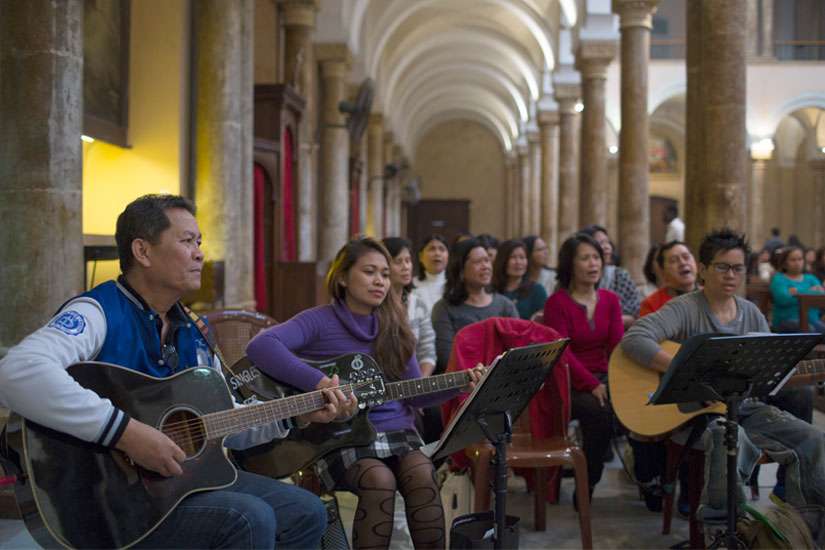Such is a typical scenario for the approximately 30,000 Filipinos in Lebanon, most of whom are women working as domestic helpers. Theirs are lives of service and sacrifice to earn money to send to their families back home.
The Philippine government said that in 2013, more than 1.8 million Filipinos were employed in other countries, and this did not include seafarers. The money that workers send home represents more than 13 per cent of the nation's gross domestic product.
Maria Almanon, 43, of the Philippines' Aklan province, earns $300 a month — the typical salary in Beirut for a live-in domestic worker. When the mother of four came to Lebanon five years ago, her youngest child was just five, and her oldest was 16.
Almanon has returned to the Philippines only once, last year, to visit her children and husband, a farmer. That was just before Typhoon Haiyan struck the Philippines in November 2013 and washed away their house and completely wiped out her husband's rice crop.
Her family is still in temporary living quarters in Aklan and, since Haiyan, her husband has yet to reap a harvest, for which he earned $200 to $300 a month. In addition to her family's daily needs, there are college tuition payments for her son.
"It's a big burden for me, because there is no other work for my husband," Almanon told Catholic News Service as she gathered with her friends after English Mass at St. Joseph Church in Beirut. The heaviness of her responsibility showed in her wearied expression.
"I was so worried and crying all the time," she recalled of being in Lebanon during the 2013 typhoon. She expressed relief that the worst of Typhoon Hagupit, which first made landfall Dec. 5, seemed to have passed.
Not being able to carry out her role as a wife and mother in the day-to-day routine of family life causes Almanon anguish.
"I'm always thinking and worrying about my children," she said. "Being so far away, it's very difficult, I feel so helpless. At least if we are all together as a family, we can face problems together, and I can be there for my children."
Almanon looks forward to the spiritual nourishment she receives every Sunday during Mass and the gatherings afterward upstairs at the Afro-Asian Migrant Centre.
Since 1984, two Jesuits — American Fr. Martin McDermott and Dutch Fr. Theo Vlugt — have served as full-time chaplains to the Afro-Asian migrant mission in Lebanon.
Lebanon is host to about 200,000 Afro-Asian workers, "pushed by poverty to work abroad to obtain a salary to send home," Vlugt told CNS. "They are in a foreign country, with a different culture and customs, different food, different languages. Everything is different for them."
"But the Church is the one place that feels just like home, where they can come together and celebrate," Vlugt added during a post-Mass potluck lunch prepared by the migrant community.
"We first are pastoral workers, to keep them going to Mass, to receive Communion, to pray and gather together," he said of his mission with McDermott. "If they (the migrant workers) don't have this, they face difficulties and temptations."
McDermott, who was visiting the United States in December, once told CNS of his work with the Afro-Asian community in Lebanon: "This is the kingdom of God."
McDermott serves as spiritual advisor to Couples for Christ, a Catholic movement intended for the renewal and strengthening of Christian family life, founded in the Philippines in 1981. Couples for Christ was established in Lebanon in 1999 and currently has 120 members, most of whom are Filipinos.
The group meets after Mass for a household prayer meeting and fellowship.
"Before, I used to pray, 'Lord give me ...,' but through the community I've learned to thank Him for the blessings I have," Niza Gallardo of Iligan, Philippines, told CNS.
Gallardo has been working in Lebanon as a domestic helper for 20 years. The 45-year-old woman sends the money she earns to help support some of her eight adult siblings, many of whom have no work, as well as to nieces and nephews.
"If I have, I give," she said. "Especially when you are in the service of the Lord, this is the right thing to do."
Like her fellow migrant workers, Gallardo's life has not turned out as she had imagined.
"I wanted to be married to a nice man," she admitted with a giggle.
When Pope Benedict came to Lebanon in 2012, a large group of the migrants from the St. Joseph community attended the Mass at Beirut's waterfront.
Now they are excited for Pope Francis' visit to the Philippines Jan. 15-19.
"My hope for the Pope's visit is that our country can live in harmony, that people will love one another," Gallardo said.

